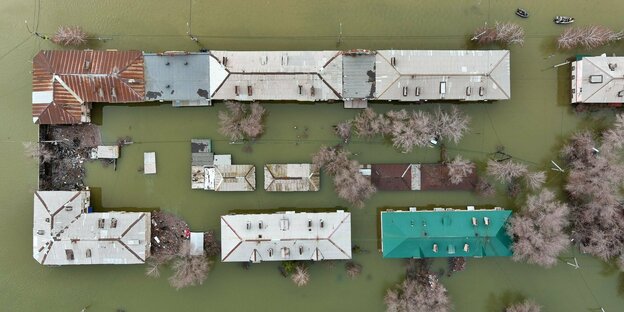After the dams broke, many places in Russia's Orenburg region remained under water. The city of Orsk, on the border with Kazakhstan, is especially affected.

Aerial photography shows the flooded area after a dam burst in the city of Orsk. Photo: Vladimir Astapkovich/imago
MOSCOW taz | When the water reached the threshold of her house on the outskirts of Orsk, Lyubov relented. The 93-year-old woman took her daughter to the apartment in a multi-story house on a hill. “Luckily there is no water here,” she says over the phone.
Just a few kilometers away, the town of almost 200,000 inhabitants on the border with Kazakhstan, about 1,700 kilometers east of Moscow, has been submerged in floods for days. Several districts are flooded because the dam that was supposed to protect the city from the flooding of the Ural River broke in several places. Almost 7,000 houses are affected and in videos from the city you can only see the roofs of some.
The Urals, which divide the former industrial city of Orsk between Europe and Asia, are a meandering river in this region. One that repeatedly overflows and, above all, floods the old town of the mountainous steppe city. People here are used to flooding in spring, but no one expected such magnitude. They say it is the worst flood in 100 years.
Little by little the water reached the new town with many prefabricated buildings, central squares and parks disappeared in the floods. Adjacent towns remain under water for days and the regional capital, Orenburg, about 300 kilometers to the west, is also affected. The Urals have risen to eleven meters, the critical value is nine meters. Observers expect the peak to occur on April 10.
Better prepared
The border with Kazakhstan is only 15 kilometers away. Many Russians fled here after Putin's “special military operation” in Ukraine to avoid being recruited to kill. Now the country seems to be better prepared for the Ural floods. The Kazakh government had been monitoring the situation in the rivers for weeks and organizing emergency shelters. More than 72,000 people have been evacuated from northern Kazakhstan.
Meanwhile, the Orscians are angry with their administration. Last week, Vasily Kosupitsa, the city's mayor, appeared calm as he inspected the dam. “There is currently no threat. People are not afraid of flooding. This year's flood is the first test of the dam's resistance,” he stated.
Less than two days later, the dam broke. Russian President Vladimir Putin did not comment on the flooding. This is the usual attitude of this 71-year-old man who, whether in the event of accidents, terrorist attacks or natural disasters, waits.
People are left with the bitter feeling that the State “no longer cares about them as always.” However, some also think that their president knows nothing about the incidents and ask him for help. Some residents of Orsk also gathered on Monday afternoon to make Putin aware of his suffering.
People feel abandoned
Over the weekend he sent his disaster protection minister, Alexander Kurenkov, to the city. State television quoted the man as saying: “The evacuation was called a week ago, people didn't take the calls seriously, they thought it was a joke.”
These phrases outrage the inhabitants of Orsk: “Now it's our fault! In the end they say that the Ukrainians destroyed the dam, with the help of Biden. “Those are the most hackneyed explanations today!” writes one person in a chat. “As is often the case, we are left alone with our suffering,” says a 51-year-old man from the “First Mai” district, affectionately known as “Maika” in the city.
It is mainly Maika residents who miss the city's help. “In our district there were no sirens or calls to leave the houses. “Here we measure the water level ourselves. To this day we have no gas, the bread shelves in the stores are empty,” says the woman, who lives with her teenage son in a house in Maika.
Orskers are organized into chats. Here they post photos of flooded streets, offer free rooms, write about where there is fresh water and let their anger fly. “The mayor has to go! What do I pay my taxes for? Get drunk with everything I've got while he says everything is under control?” he says.
During disasters, the state allows the participation of civil society that it would otherwise stifle. It depends on the help of those who act. In Maika they are happy with the volunteers. “I am so happy that these wonderful people exist. They simply brought our children clothes and some toys,” Yevgeny writes in a conversation.
Their house is under water, the family has sought refuge in an emergency shelter, they don't know what will happen next. “We can only trust ourselves. This is Russia, girl,” says the 51-year-old from Maika. There is a lot of bitterness and helplessness there.